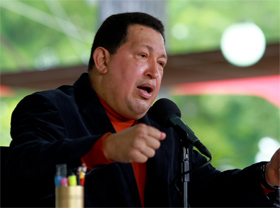Hugo Chavez's Caribbean fuel lifeline

By Debbie Ransome
Hugo Chavez’s PetroCaribe cheap oil deal with most of the Caribbean Community (Caricom) has kept member countries from falling off the global downturn precipice for some time.
The crude oil sales under the PetroCaribe arrangement needs small upfront payments with the rest being paid back on a 25-year low interest basis and partial payments in agricultural products such as rice and sugar.
Beneficiary Caricom countries are Antigua and Barbuda, the Bahamas, Belize, Dominica, Grenada, Guyana, Haiti, Jamaica, St Lucia, St Kitts and Nevis, St Vincent and the Grenadine and Suriname.
An IMF review estimated that PetroCaribe funds will account for nearly half of Haiti’s domestically-financed capital spending this year.
And, in Jamaica more than two-thirds of crude oil imports come through the deal.
Basic funding line
The seven-year-old PetroCaribe Alliance also means that loans from the Venezuelan Alba bank and the Alba Caribe Fund are asset-backed by oil and therefore do not count towards a country’s national debt.
When Venezuela’s opposition had promised to end the deal if they had won Sunday’s presidential election, this could have been easily done under a one-month cancellation clause within the deal.
In Jamaica, the Chairman of the country’s PetroCaribe Development Fund, Dr Wesley Hughes had told The Gleaner newspaper in August that the end of the agreement would have left Jamaica seeking US$50m per month ($600m per year) towards its balance of payments.
“It tells you...how important this arrangement is to Jamaica at this point in time,” he told The Gleaner's Forum.
Dominica’s Prime Minister Roosevelt Skerrit described the agreement in June as the “lifeblood” of many countries.
Election reaction
Cuba, while reeling from the 1990s collapse of the Soviet Union, had found a new ideological friend in Hugo Chavez after he came to power in 1998.
Cuba has returned Venezuela's largesse with the exchange of its skilled personnel as well as its high-level health treatment when President Chavez had been diagnosed with cancer.
‘‘I'm sure it’s a big sigh of relief (in the Cuban government), because what they faced under Capriles was a certain renegotiation, at minimum, of the oil deal,’’ Philip Peters, a Cuba observer at the Virginia-based Lexington Institute think tank told Associated Press.
‘‘It (a change of government) would have been a tough blow.’’
Also reacting to the Chavez victory, Caricom's Secretary-General, Irwin LaRocque, described Caricom-Venezuela relations over the years as "fruitful".
"As our countries strive to maintain and accelerate development gains, the Community looks forward to continued collaboration and cooperation in various international and hemispheric fora such as the Organization of American States and the Community of Latin American and Caribbean States, as well as through initiatives such as PetroCaribe," Ambassador LaRocque said.
